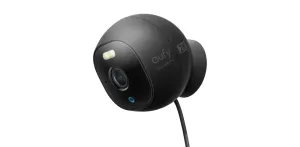Why Consider Indoor Security Cameras?
Let’s be real, the world isn’t always a bowl of cherries. And while we’d love to always think the best of every situation, securing our homes and keeping an eye on things, whether we're home or away, gives us that extra peace of mind. This is where indoor security cameras come into play. Did you know that simply having a visible security camera can deter burglars and other unwanted guests? It’s like having a guard dog that doesn’t need to be walked.
A few years ago, my neighbor’s apartment was broken into while she was on vacation. It was a shocking event that rippled through our community. The lack of surveillance inside her home meant there was little evidence to help in capturing the culprits. Witnessing that, I decided to get myself a couple of indoor cameras — definitely a decision I haven’t regretted.
Choosing the Right Camera for You
It seems like every week there's a new home security camera on the market, each with its own set of bells and whistles. So, how do you choose? Here are some pointers based on what I learned and what might matter most to you:
- Video Quality: If you can’t see what’s happening, why have a camera, right? Look for cameras that offer 1080p resolution or higher. Trust me, this level of clarity can make all the difference when spotting details during playback.
- Field of View: Do you want to see the entire room or just the area by the door? Wider angles let you see more, but can sometimes feel a bit distorted. Typical ranges are from 120° to 180°. If wide coverage is a priority, fisheye cameras or PTZ cameras can offer great flexibility.
- Night Vision: This is crucial. There’s no point in recording if you can’t see anything in low light. Look for cameras with good night vision capabilities — some even offer color night vision now.
- Audio Features: Some cameras come with two-way audio, allowing you to speak through them to whoever is on the other side. It’s a feature that turns handy, especially if you’re telling the delivery guy just where to leave your package.
- Storage Options: Do you want your footage stored on the cloud, or would you prefer local storage on an SD card? There are pros and cons to each, depending on your security concerns and convenience needs.
Once you identify your primary needs, comparing the options becomes much more straightforward. And if you really want to go deep, consider cameras that integrate with your current home automation system. Seamless, huh? (cnet.com)
The Set-Up: Easier Than You Might Think
Speaking of setup, you’d think installing security cameras requires an engineering degree, but it’s actually simpler than assembling most IKEA furniture. Most brands design their cameras with a plug-and-play approach. Here’s a quick rundown:
- Placement: Where you place your cameras is crucial. Aim for high corners for wider views, or near entry points to catch comings and goings. Just ensure the camera's view isn't blocked by furnishings or decor. (security.org)
- For help, check out these indoor camera placement tips.
- Connectivity: Most cameras now support Wi-Fi, which means you can place them pretty much anywhere within your network’s range.
- Power source: Battery-powered or plug-in? Batteries offer more flexibility in placement but remember, they need regular recharging or replacement. Plug-in models mean you never have to worry about a dead camera, provided the power’s on.
I learned the hard way that the direction your camera faces matters after accidentally setting one up in front of a light — all I got were silhouetted figures. Not quite the goal.
Privacy Concerns with Indoor Cameras
Now, on to the slightly sticky stuff — privacy. Having cameras inside your home is great for security, but what about the privacy of household members and guests? Here’s how you can balance security with privacy:
- Be Transparent: Let everyone in your home know where the cameras are and what they record.
- Cameras in Common Areas: Stick to placing cameras in shared spaces like living rooms and kitchens, and avoid private areas, like bathrooms, obviously, and bedrooms unless absolutely necessary.
- Control Access: Who watches the footage? Make sure that only authorized individuals can access camera footage.
- Data Security: Use cameras from reputable brands that guarantee encryption and other security measures to protect your footage from hackers.
It’s all about using these tools wisely to enhance security without crossing lines. Interestingly, many families have found cameras helpful for keeping tabs on pets or elderly parents — another layer of security, if you will.
Practical Applications: Putting Cameras to Good Use
If you’re anything like me, thinking about security can make your head spin. But I've found some surprisingly beneficial uses for my indoor cameras over the years:
- Keeping an Eye on Pets: Ever wonder what your pets do when you’re not home? I found out my dog likes to sleep on the sofa, despite him knowing it's off-limits!
- Checking in on Contractors: Having work done at home can be less worrying when you can check in visually. It's reassuring to see that the job's being done well and respectfully.
- Peace of Mind for Parents: For those with kids, sometimes you just need to peek to see they’re actually doing homework or sleeping soundly.
These cameras aren’t just about security; they’re about understanding day-to-day life better too.
Final Reflections: A Safer Space for Everyone
While the thought of setting up indoor security cameras might conjure images of high-tech fortresses, it really boils down to creating a safer, more informed environment. Whether it's catching adorable moments of your pets in action, ensuring your home is respected by service providers, or simply making sure the kids didn’t turn the living room into a makeshift water park, these cameras offer more than just security. They integrate into our lives, providing small comforts day by day.
As we wrap up, think about what areas in your home could benefit most from a little extra oversight. Remember, the goal isn't to create a surveillance state in your home but to expand your awareness and control over your private domain, keeping what matters most a little safer.
If anything, consider starting small. Maybe just one camera in the living area, just to test the waters. It’s a step that might make a monumental difference to your peace of mind. And isn't that a worthwhile investment?





